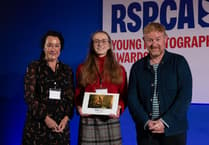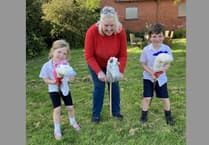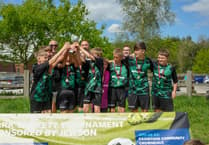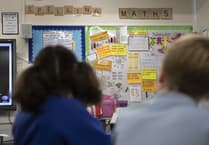POVERTY, malnutrition and leprosy were just some of the ailments encountered by a Tavistock nurse who recently volunteered her medical services in rural Kenya.
Practice nurse and team leader at Abbey Surgery Emma Banks spent two weeks in Tsarvo, in rural south west Kenya, with the charity, Camps International, along with a team of other UK medical professionals, to provide medical support to Kenyan doctors and nurses during a number of temporary clinics set up by the charity in different areas.
In the rural areas of Kenya, people travel miles to visit these types of ‘pop-up’ clinics as usually they would have to travel to the nearest city hospital and pay to see a nurse, which many can’t afford to do.
Emma said around 400 plus patients came through the doors of their make-shift clinics each day — sometimes more, working non-stop for 12 hours a day.
She said: ‘You just can’t describe the poverty over there. We arrived in Tsarvo, which was really rural — you think of Devon as rural but this was something else. We were put up in a specially made camp of straw huts but had proper beds — it was a bit like glamping. Over the first couple of days we met up with the local Kenyan teams and went to their workplace and saw the labour room — I would say it was like the days of the programme Call the Midwife — there were buckets to sterilise things and a couch and that was it.
‘All the clinics were advertised through word of mouth and local surgeries and we were invariably setting up the clinics in schools. We had a tent shelter as a reception area and we swept the mud floors and rearranged all the bench desks for consultation areas. We had it as hygienic as possible with the resources we had.’
Emma said her aim before she went out was to become an independent consulter — undertaking patient consultations on her own rather than shadowing someone — which she achieved a few days into the clinics.
‘After my first day of shadowing someone I was thinking I was completely out of my depth and on the second day I didn’t feel any better. I had to leave my UK head at home and think outside of the box. Malaria and TB were the big things to look for, which aren’t that common in the UK. By the third clinic I was put with a highly experienced UK nurse practitioner who was a newbie to the camp. We did one consultation together and then she said I’d be fine on my own. I was quite chuffed but typically for the rest of the afternoon I had lots of complicated cases.
‘On one of the days I had a lady come in with what I thought was leprosy. I asked the Kenyan nurses who weren’t sure so I had another UK nurse examine her who also confirmed it. The lady’s hands were seriously deformed and swollen with white lesions on the skin. Her eyes didn’t look right either — one of her eyes wouldn’t close properly, which are all classic signs. Apparently she got it three years ago after the birth of her child and she hadn’t done anything about it.’
Emma said she also saw a lot of cases of people who had arthritis through years of hard work, a lot of people with stomach pains predominantly from malnutrition as many she saw were only eating two meals a day and two cups of water. One lady was treated for a dislocated shoulder from carrying huge barrels of water.
Emma was grateful for all the donations of both equipment and money she received form the people of Tavistock before she went out.
‘The people of Tavistock, through Abbey Surgery, donated £518 over a three-week period which was phenomenal,’ she said.
The money raised by Emma and the other UK medics was divided between different causes, including a local women’s group which aims to empower women to work and bank their own money so that it is safe for them to use for their children’s schoolbooks and equipment, rather than taken by their husbands and spent on alcohol. Money was given towards cataracts operations and cervical screening and some was donated to a project set up by a local nurse to build a small well.
Emma also managed to get the team to agree to give some money to a patient she saw at one of the clinics.
She said: ‘It was really sad, but on our last day this most dishevelled man came in who thought his testicle had gone up into his body, but what he showed me was a hernia. He had been to the hospital, which was more than an hour away and had been advised to have surgery. He was a welder, was divorced and had three kids under 10 to look after. It transpired that he had a herd of cows which he wanted to sell to get the money for the surgery, but he wasn’t fit enough, so his brother took them to market for him but never gave him the money — he took everything he had.
He could no longer work, he had no money and he was living off food provided by his other brother to survive. The other nurses and I agreed that we would pay for him to be operated on.’
Emma said her time in Kenya was very emotional but was an experience she would never forget.
‘It was very sad. We had to think on our feet as we didn’t have all the equipment we were used to, we only had a basic kit. It was like picking up a GP surgery without the doctors and putting it in a very rural environment.
‘It was great seeing the teams, who didn’t know each other, working together — crying, laughing and learning from each other. It was worth every minute. Anyone can do it, you don’t have to be a medic. Whatever your background, we can all wash feet, sterilise instruments and train how to do a sight test. They take lots of non medics on the camps. I would urge anyone to give something like this a go. I was out of my comfort zone 100 per cent of the time but it is something we can all do.
‘I have to say a huge thank you to everyone for their donations. We all took nearly 56 kilos of donations over each. It was unbelievable. The generosity of people was amazing.’





This article has no comments yet. Be the first to leave a comment.